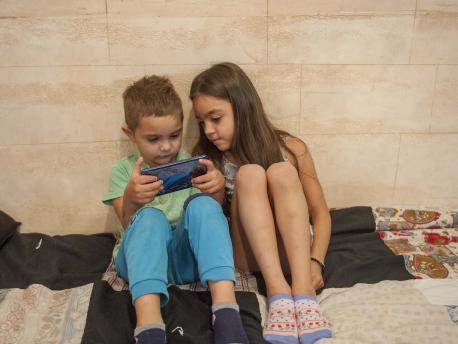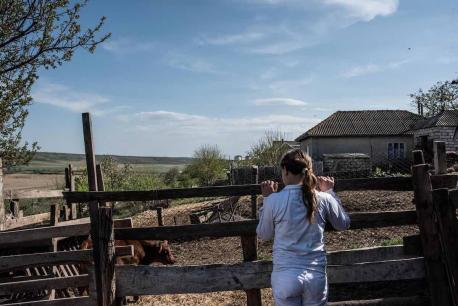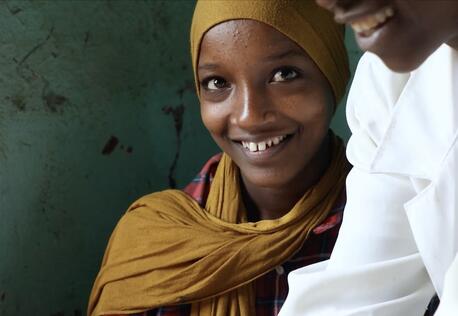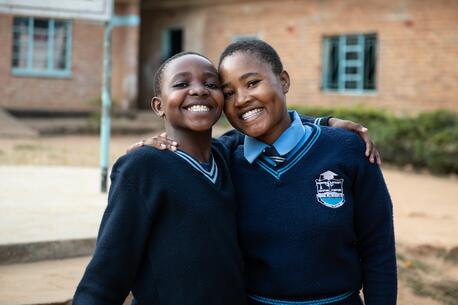
How Parents Can Answer Kids' Questions About Staying Safe Online
Young people around the world are learning how to protect themselves from cyberbullying.
"Don't talk to strangers" is one of the first lessons parents teach kids to keep them safe. But with children exposed to the internet at an early age — through online gaming and smartphone apps like Tik Tok — it's a rule that's hard to enforce. Especially when the internet makes it easy for strangers to disguise themselves as "friends."
Maria, a 16-year-old from Madagascar, has been fending off such overtures since she joined Facebook. She lives in a resort town that is attractive to tourists for its beautiful beaches — but also for its thriving sex tourism trade. Thanks to a club UNICEF helped found at her middle school three years ago, Maria now knows how to spot "friend" requests from fake social accounts and how to stay safe both on and offline.
“If we understand what our rights are, we can play a role in protecting and promoting them," says Maria.

UNICEF online safety training has helped 16-year-old Maria, who lives in Madagascar, fend off predatory Facebook “friend” requests. It's also taught her about how to protect her right to safety both online and off. © UNICEF/UN0285176/Ralaivita
Sadly, not every child or teen is as well informed about how risky sharing personal information on social media can be.
Today, more than one-third of children are regular internet users. That proportion is only expected to grow, and with it, an alarming trend unless parents and young people take greater care to block the harmful content and abuse kids can be exposed to online. According to a September 2019 UNICEF poll of 170,000 13-24-year-olds in 30 countries, one in three young people said they had been a victim of online bullying. One in five found the harassment and violence so unbearable they had to skip school. Growing up isn't always easy, but if a child is active online and seems chronically distressed, cyberbullying may be the culprit.
To offer kids greater protection, UNICEF asked young people what they most wanted to know about cyberbullying. Then, UNICEF specialists and international cyberbullying and child protection professionals teamed up with Facebook, Instagram and Twitter to supply the answers.
Here are the top ten questions of kids polled, along with the experts' tips for how parents can address them.
Am I being bullied online? How do you tell the difference between a joke and bullying?
Children may know that they sometimes feel sad or left out after reading a harmful Facebook or Instagram post, but many struggle with how to tell the difference between what's a joke and what's bullying.
Parents can help their children get in touch with their feelings by offering this perspective: All friends kid around with each other. But there's a difference between teasing and making fun of someone to cut them down. A mean comment followed by “just kidding” or “don’t take it so seriously” doesn't excuse the behavior. Another good rule of thumb: If kids think others are laughing at them instead of with them, the "joke" isn't a joke; it's bullying.
Being bullied is extremely painful. But being bullied on a social network when posts go viral can be devastating. The bottom line: Everyone has a right to be respected, and people who make hurtful comments should be called out immediately. If they won't stop or apologize, it's time to get help.
What are the effects of cyberbullying?
Kids who are continuously cyberbullied feel under attack. Nowhere seems safe, not even home.
What are the warning signs? Your child appears upset, is easily embarrassed or ashamed, feels insecure and angry. Take notice if they stop enjoying things they used to love or complain of stomach aches, headaches and trouble sleeping.
Unfortunately, bullying and online harassment can prevent kids from speaking up, making it even more damaging. Unchecked cyberbullying can take a significant toll on kids' mental health. In extreme cases, some have taken their own lives. If you notice any of these red flags, check in with your child about their online habits.
Who should I talk to if someone is bullying me online? Why is reporting important?
One of the scariest things for a child who's being bullied is having to keep it to themselves. Maybe they are afraid they are too sensitive or that the situation will get even worse if they tell someone. There are people in their lives who can help — parents, close family members, a favorite teacher — but they won't be able to if they are kept in the dark.
Having the support of a trusted adult gives a bullied child the comfort and courage they need to take that crucial next step of reporting the behavior. If your child seems troubled, withdrawn or sad, try to open lines of communication and reassure them that no matter what they are going through, you are there to help.

The internet has its risks and rewards. Being able to surf online sustains vulnerable kids like Fares. He lives in the Gaza Strip, where rolling blackouts for hours a day have made it hard to stay connected with the outside world. But when his laptop is up and running, he uses it to discover new parkour moves and online groups. © UNICEF/UNI190722/d’Akl
I am experiencing cyberbullying, but I'm afraid to talk to my parents about it. How can I approach them?
Cyberbullying can isolate kids from parents and friends and make them feel too scared or beaten down to reveal what they are going through. Kids may also fear that their parents will overreact or make things worse.
Checking in regularly with your children about their social media habits is one way to sniff out trouble. But don't be put off if your child doesn't want to talk. At certain ages, kids are less inclined to open up. Casual check-ins — during car rides or getting ready for dinner — can offer clues to problems afoot.
If your child reveals that he or she feels bullied, try to draw them out about what they're experiencing. Ask them to show you the online exchanges and talk about why they hurt.
You might not have an instant solution, but letting your child know that together you'll figure a way out will go a long way.
How can I help my friends report cyberbullying, especially if they don't want to do it?
Your child may not be experiencing cyberbullying but they may know someone who is, and there’s a lot you can do to help them offer support.
Teach your child the importance of being an ally. That means being aware that their friend may feel fragile and isolated, and need extra kindness and help deciding what to do and what they might say and to whom. Encourage your child to be a good listener, but stress how crucial it is to convince the bullied friend to talk with someone who can help. Make sure your kid knows that unchecked bullying is very serious.
If the friend wants to report the bully, your child could offer your support and even go along if he or she feels comfortable.
You and your child can also explore the social media tools that are there to help. Facebook, Instagram and Twitter have made it easy for friends to help friends who are being cyberbullied. Instagram’s Restrict function, for instance, lets users protect their accounts without having to block someone — an option some children might fear could invite further trouble. Twitter also has useful resources, which are outlined in the guide Teaching and Learning with Twitter.
How do we stop cyberbullying without giving up access to the internet?
Being online has its rewards and its risks. Kids need parents' help navigating both. Talk with your child regularly about the apps and social networks they use, how much time they are spending online or texting each day and how to ensure that built-in privacy settings are optimized to keep them and their data secure.
Children who are being cyberbullied may rush to delete the app or account where they are being harassed. That might be the right choice for the moment but it's probably not a long-term solution. Before they sign off, see if the social media platforms can offer help. Instagram, for instance, now has a Bully Filter that uses artificial intelligence to detect and hide mean comments intended to harass or upset people. Helping a child take action is more empowering than allowing a bully to drive a wedge between them and a network of online friends and experiences that they enjoy.

Kids are never too young to learn about online safety. Vasilisa, 6, lives in Serbia, and she and her mother took part in UNICEF-supported workshops held at her preschool to teach the entire family how to stay safe on the internet. © UNICEF/UN0341446/Vas
How do I prevent my personal information from being used to manipulate or humiliate me on social media?
Answering this question for your kids is one of the most important things you can do. Urge them to stop and think before sharing anything online. They should never give out such personal details as your family's address, telephone number or the name of their school. Remind them that what goes online stays online — if not forever, then long enough to expose them to unwanted attention.
Parents can protect their children by looking at the apps and social platforms they use and adjusting the privacy and safety settings so they can:
- Decide who can see their profile, send direct messages or comment on their posts
- Report hurtful comments, messages and photos and request they be removed
- "Unfriend," or prevent someone from contacting them
- Delete or hide posts on their profile
If your child needs extra courage to shut a bully down, reassure them that many social networks don't notify the people they block, restrict or report.
Is there a punishment for cyberbulling?
Remind your child that victims of any form of violence, including bullying and cyberbullying, have a right to justice and to hold the offender accountable.
If it's a fellow student who's bullying your child, most schools will take action. Although legislation against bullying — particularly cyberbullying — is relatively rare, laws against harassment can be used to punish cyberbullies.
In the U.S., there is no Federal law that directly prohibits bullying. But when someone is targeted for his or her race, ethnicity, color, national origin, sex, disability or religion, schools' responsibility to stop harassment can legally obligate them to address it. More information about your state's approach to bullying is available here. StopBullying also offers helpful information about cyberbullying and how to stop it, along with useful tips for parents about how to help their children navigate the digital landscape.
Internet companies don't seem to care about online bullying and harassment. Are they being held responsible?
Internet companies are increasingly paying attention to online bullying. Many of them are introducing new tools, guidance and ways to report online abuse.
But even more is needed. Many young people experience cyberbullying every day — some of it extreme. Technology companies have a responsibility to protect their users, especially their young users. We must all hold the companies accountable when they’re not meeting these responsibilities.
Are there any online anti-bullying tools for children or young people?
Each social platform offers a variety of ways you can:
- Restrict who can comment on or view your posts or who can connect automatically as a friend
- Report cases of bullying
- Block, mute or report cyberbullying
Be aware that cyberbullying happens in every community and look for ways you can help — by raising awareness, calling out bullies and forming coalitions of concerned citizens. School settings are a natural place for children, parents and teachers to mount a collective offense against bullying of all kinds. School administrators and principals can lead the charge against bullying by creating an environment in which everyone feels safe to address issues that affect both individuals and the community. Parents and kids can do their part by letting the school know if they or someone they know is being cyberbullied.
Even a simple act of kindness can go a long way.
If you are worried about your child's safety, visit Child Helpline International to find help in your country. Many countries have a free helpline you can call to talk to someone anonymously.
Top photo: In a Roma settlement in Serbia, Andrej, 4, and Andjela, 6, play an online game on a cellular phone at home. © UNICEF/UNI218442/Pancic
HOW TO HELP
There are many ways to make a difference
War, famine, poverty, natural disasters — threats to the world's children keep coming. But UNICEF won't stop working to keep children healthy and safe.
UNICEF works in over 190 countries and territories — more places than any other children's organization. UNICEF has the world's largest humanitarian warehouse and, when disaster strikes, can get supplies almost anywhere within 72 hours. Constantly innovating, always advocating for a better world for children, UNICEF works to ensure that every child can grow up healthy, educated, protected and respected.
Would you like to help give all children the opportunity to reach their full potential? There are many ways to get involved.





